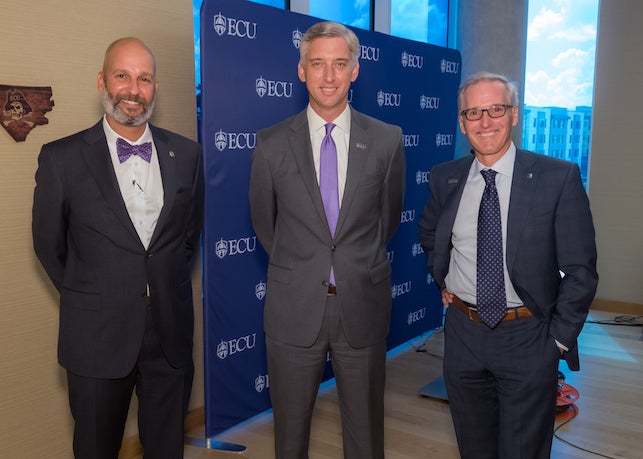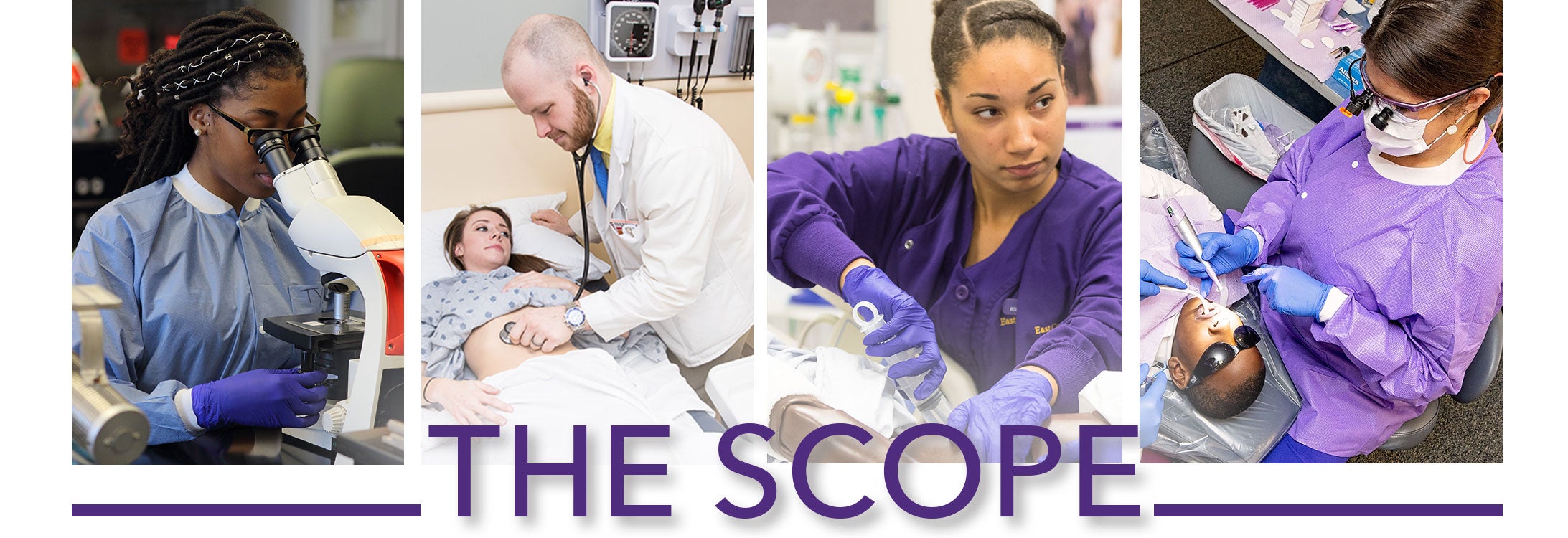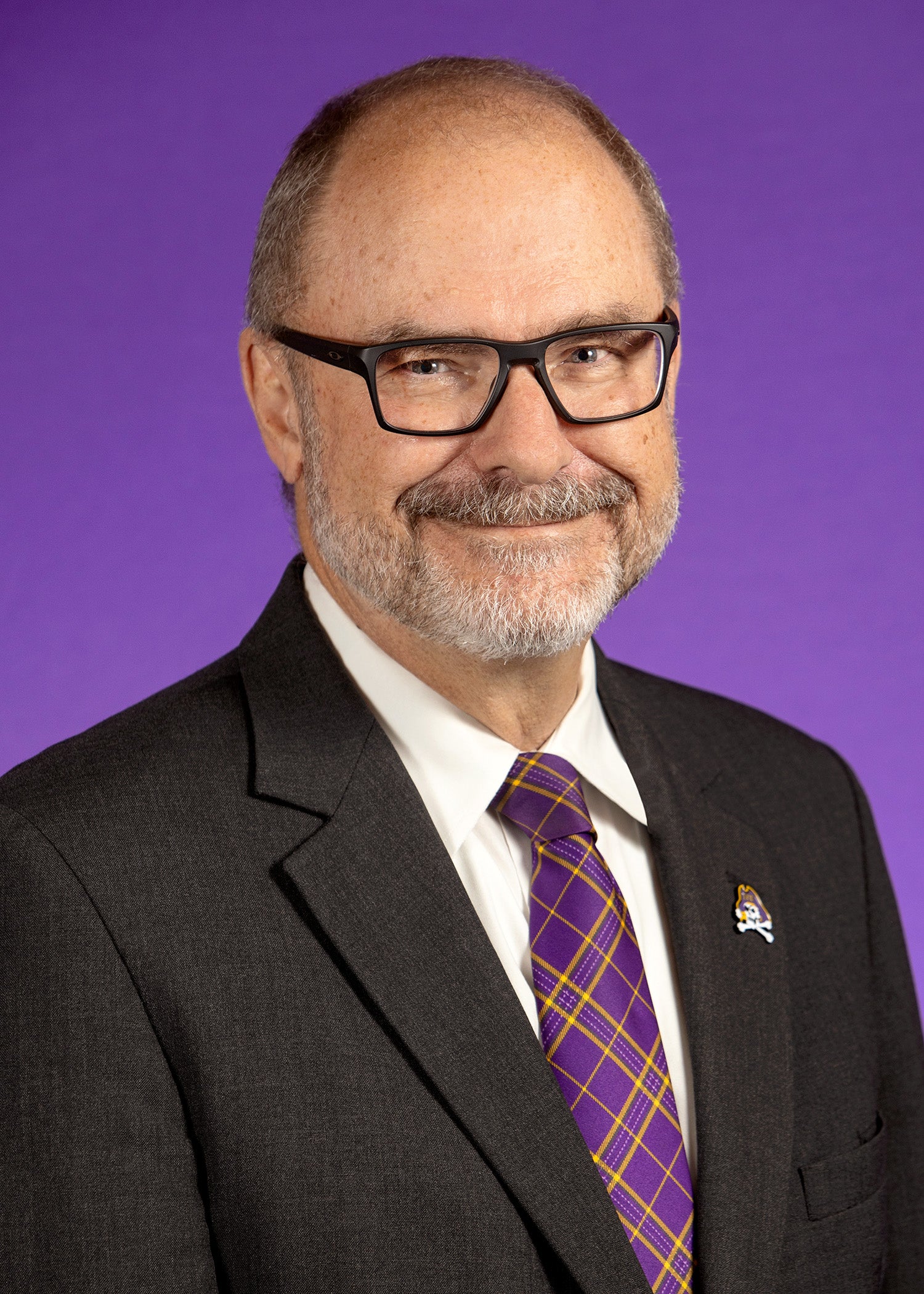June 2021
Welcome to “The Scope,” the newsletter of the ECU Division of Health Sciences.
Welcome to the June 2021 issue of The Scope, the newsletter of the ECU Division of Health Sciences.
Good day to you! I hope this note finds you and yours doing well. I read a “bless your heart” in the local newspaper a few weeks ago that suggested it was now “amateur hour” at ECU as a geography professor steps into the vice chancellor role here in the Division of Health Sciences. Can’t say that I blame the uninformed author. As an instrumental portion of a large and complex university, this division deserves effective leadership and that’s what I hope to provide even if on an interim basis. I’ve been an interim VC for research, an interim provost and an interim chancellor. So, I know I can handle this new interim challenge. Even an old dog might learn a few new tricks.
Having said that, I need you! Make no mistake—I need your expertise and I need your input as we move forward together. I have tremendous respect for our nationally recognized programs of instruction, research and service. Your voice is important to me. I’ve been fortunate over the past few weeks to hear from many of you and I have needed to call upon many of you for information, for intelligence and, in a few cases, for wisdom. Thanks for welcoming me to the west side with open arms and support. I also want to thank our newly appointed deans, Drs. Mike Waldrum and Jason Higginson, for accepting these key leadership roles in our Brody School of Medicine. I have already enjoyed and appreciated working beside them. It’s incredibly refreshing to know that the mission and the people who achieve the mission remain at the core of our collective concern. That will not change.
No doubt that this has been a rather difficult year for all of us with COVID, social unrest and leadership changes (at many levels). Plenty of uncertainty, anxiety, frustration and disappointment to go around. I am thankful that despite all that tumult you have not been distracted. Your focus on mission, the success of our students and the health of our region (and beyond) is remarkable. There is legacy in your commitment! History will applaud your efforts. More than ever, our mission places a high premium on innovation and change. Some of that will occur in the laboratory, some of that will occur in the classrooms and some of that will occur in the clinics. It’s all very important and it’s all tied to mission. The research is important. The teaching is important. And the service is important. Moreover, the integration of those is where the real excitement lies. Intersections are always interesting places and our mission benefits from our willingness to embrace the intersection. Let effective collaboration become our competitive advantage.
Finally, I hope that each and every one of you can see yourself in our mission outcomes. If you can’t, please shoot me an email at mitchelsonr@ecu.edu and I’ll help you.
Dr. Ron Mitchelson
Interim Vice Chancellor,
ECU Division of Health Sciences
New Beginnings
This month brought news that ECU and Vidant Health will join forces.
East Carolina University will move toward full clinical integration with Vidant Health and the creation of a distinctive health system brand – ECU Health or similar branding – to serve the 1.4 million residents of eastern North Carolina.
As part of executing the vision for a clinically integrated and rebranded academic health system, Rogers has appointed Dr. Michael Waldrum, chief executive officer of Vidant Health, as the seventh dean of the Brody School of Medicine at ECU. The appointment is effective July 1, 2021. Waldrum will continue to serve as CEO of Vidant Health. In his role as dean, Waldrum will report directly to the chancellor.

(Left to right) Dr. Jason Higginson, Chancellor Philip Rogers and Dr. Michael Waldrum, at a Vidant ECU press conference. (contributed photo)
“This is an exciting day for our university and for the people of eastern North Carolina,” Rogers said. “By aligning the leadership of the Brody School of Medicine and Vidant Health, we will be able to more effectively train future physicians, provide enhanced research opportunities, advance technological solutions and better coordinate the delivery of health care to the people of our region.”
This is the first step toward a shared goal of increasing collaboration and integrating Vidant Health and the Brody School of Medicine. The two organizations will work together with academic and clinical leadership to transform together, to build on combined strengths, and to create a regional health care, research and educational enterprise.
Dr. Jason Higginson has been appointed as executive dean of the Brody School of Medicine; he is currently serving as interim dean. Higginson will manage operational aspects of the medical school activities. He will serve as liaison between department chairs and the dean and will provide senior executive management of personnel and operations within ECU Physicians, the clinical practice of the Brody School of Medicine. He will also serve as the chief administrative officer of ECU Physicians for clinical areas and various transactions.
“Dr. Waldrum and Dr. Higginson are the right leaders at this pivotal moment in Brody’s history. They will work collaboratively to ensure we design a strategically aligned and clinically integrated academic health system for our region that proudly leverages the ECU brand,” Rogers said. “Today, there is no transfer of assets or change in anyone’s employment status. Instead, this decision represents a step toward realizing our full potential together in providing access to advanced care for all of eastern North Carolina through ECU Health or a similarly branded academic health system.”
UNC System President Peter Hans said of the announcement: “This begins to place ECU and Vidant into closer organizational alignment, so the mission remains the priority – serving the health care needs of eastern North Carolina, rural areas of our state, and beyond. Chancellor Rogers’ selection of Dr. Waldrum and Dr. Higginson demonstrates that they all realize the most strategic and productive way forward is working more closely together.”
Chancellor Rogers said much work will be needed in the future to make today’s announcement a reality.
“Boldly, we will move forward together with a shared vision and set of values. We believe this is the most innovative, long-term and strategic solution to serve our region, and if we keep our joint mission at the center of this work, then we will look back on today’s announcement as a milestone in our university’s history,” he said.
Education
Students in the Division of Health Sciences earned spots in prestigious state and local research and service programs that will provide them valuable experience caring for the region’s patients.
Summer Scholars: Five members of the ECU School of Dental Medicine’s Class of 2025 began their stints this month as 2021 Summer Research Scholars—and look forward to making discoveries that could help their future patients.
Sara Feggeler, Kyu Lee, Ijeoma Okons, Kaisi Peele and Jackson Russell will conduct research alongside faculty mentors until August, when they will begin dental school. The students will present posters on their research projects at the Brody School of Medicine Research Day on Aug. 2 and at the School of Dental Medicine’s Celebration of Research and Scholarship on Feb. 9, 2022.

The School of Dental Medicine’s 2021 Summer Research Scholars are (from left to right) Ijeoma Okons, Kyu Lee, Kaisi Peele, Jackson Russell and Sara Feggeler.
Peele, of Ahoskie, will be mentored by Dr. Azeez Aileru, professor of neuroscience and division director of basic sciences in the Department of Foundational Sciences. Peele’s project is titled, “Angiotensin Protein Expression in Transgenic Strain of Hypertension.”
“This summer, I hope to learn how to do in-depth research and be able to directly relate my project to dentistry,” Peele said. “I hope to learn more about how the dental school makes the connection between research and the practice of dentistry, and I hope to learn more about myself and what I am capable of as a student and a researcher.”
Schweitzer Fellows: Eight students in the Division of Health Sciences have been named to the 2021-22 cohort of North Carolina Schweitzer Fellows. Four students from ECU’s Brody School of Medicine and four students from the ECU School of Dental Medicine join the class of 25 graduate students who will spend the next year learning to effectively address the social factors that impact health and developing lifelong leadership skills.
The N.C. Schweitzer Fellowship’s new class of Fellows will lead a multitude of service initiatives offering free or low-cost medical and dental care, mentoring programs for at-risk minority male youth, and support for cancer patients, new moms, people experiencing homelessness, patients struggling with chronic health conditions, and seniors with social isolation and food insecurity.
Schweitzer Fellows also experience an intensive leadership component during the program, working closely with community and academic mentors during their fellowship year. They often serve as role models for their peers, inspiring others to improve the health of those who experience barriers to care.
The 25 NC Fellows will join over 200 other 2021-22 Schweitzer Fellows working at program sites across the country: Alabama, Chicago, Columbus, Dallas-Fort Worth, Detroit; Houston, Los Angeles, New Orleans, New Hampshire/Vermont, Pittsburgh, San Francisco and Tulsa.
“Now more than ever, it is critically important our next generation of health professionals understand the challenges community members face in achieving health and wellness, learn how to develop initiatives which help overcome those challenges and use their voice to advocate for our most vulnerable,” said Barbara Heffner, director of the N.C. Albert Schweitzer Fellowship. “I’m impressed with the creative ways the Fellows are addressing the gaps in our health care system as well as those that have surfaced during the pandemic.”
Patient Care
Some of the division’s providers, researchers, faculty and students recently served the East through special care events including one geared toward the region’s farmworkers.
Sonríe means “smile” in Spanish—and there were plenty to go around on May 16, when students, faculty, staff, residents and volunteers from ECU’s School of Dental Medicine gathered in Ross Hall to provide free dental care for a group of Hispanic farmworkers from eastern North Carolina.
The school teamed with local organization Access East to provide a variety of procedures for more than a dozen patients for the event, which was appropriately named the “Sonríe Clinic.”

ECU School of Dental Medicine faculty member Dr. Acela Martinez Luna provides care to a patient during the school’s inaugural Sonríe Clinic on May 16. (Photo by Rhett Butler)
“We provided comprehensive care. Most of them sat morning and afternoon to get as much treatment as possible,” said Dr. Acela Martinez Luna, assistant professor and division director of clinical implantology for the school and one of the event’s faculty organizers.
The event was a long time coming for members of the school’s chapter of the Hispanic Student Dental Association (HSDA), who had a vision for such a clinic years ago. In 2019, they were approached by representatives from Access East, a Greenville-based not-for-profit corporation that nurtures collaborations between health care organizations devoted to coordinating access to quality care for vulnerable populations including chronically ill, indigent, underinsured and uninsured patients.
“The goal was to establish a program to provide care for Hispanic farmworkers in eastern North Carolina,” said Raul Garcia, ECU dental student and HSDA co-president. “One of the reasons we joined the ECU School of Dental Medicine is because of the mission and vision to provide health services for the underserved in North Carolina. We are able to, with the support of School of Dental Medicine, bring the vision and mission to life.”
Forty-five students volunteered to help with the Sonríe Clinic, along with 12 faculty members, three residents and other school, community and Access East volunteers assisted with care, interpreting and administrative work. Pre-dental ECU students were also invited to participate.
Those students and other organizers wanted to connect Hispanic farmworkers and their families with care and resources—a challenge brought to light especially during the pandemic.
“Farmworkers, especially migrant farmworkers have experienced many hardships and obstacles obtaining health care during this time,” Garcia said.
Juan Allen, rural outreach and Affordable Care Act navigator for Access East, said the clinic was a monumental step in the right direction for the health care of farmworkers.
“But we have to understand that after the pandemic, these medical needs will still there,” he said. “The dental school did an amazing job providing those services to the farmworkers community during the pandemic. That showed a level of commitment to assist this population.”
Research
Researchers across the division contributed to timely projects that made an impact on public health during the pandemic, including fair distribution of the COVID-19 vaccine.
Supported by CARES Act funding provided through the North Carolina General Assembly, ECU faculty experts and students in public health, geography, health information management, bioethics, psychology and folklore partnered with professionals from Vidant and faculty from Dartmouth College to design tools that provide insight into the distribution of COVID-19-related resources ethically and efficiently. Those tools have since been used to help reduce the spread of COVID-19 and guide vaccination efforts throughout eastern North Carolina.
Amid the ongoing pandemic, ECU faculty experts worked with leaders from Vidant to quickly identify the locations of vulnerable populations, the facilities at the highest risk and the need for COVID-19 vaccines across eastern N.C.

Dr. Greg Kearney, far right, the project’s principal investigator, discusses COVID-19 hot spots with collaborators, from left, Bennett Wall, Dr. Katharine Jones, Dr. Maria Clay and Dr. Rob Howard on June 7, 2021. (Photo by Cliff Hollis)
Meanwhile, bioethics faculty and authorities in health disparities shared information and context on the different populations in the state’s eastern region, their beliefs and biases related to vaccines, and created a framework for equitable vaccine distribution strategies. Others in the group are examining attitudes and beliefs about COVID-19 and the vaccines throughout the region.
The group of nearly 20 experts met via web conferences every Friday for over five months, assessing coronavirus case rates, identifying hot spots in the region and building a website to inform health care providers, public health officials and the general public. Among the many efforts that resulted from the inter-disciplinary collaboration were the ENCHealth.org website and the first of its kind Vaccine Priority Index (VPI) mapping tool.
The unique, web-based VPI mapping tool created by ECU and Vidant readily assists health care providers and health departments by identifying the highest-risk, priority populations and their locations across eastern North Carolina. The VPI uses a computed ranking index score to identify the locations of the most vulnerable populations for prioritizing vaccine delivery.
The tool displays all 100 North Carolina counties and Census tracts by their COVID-19 risk priority as reflected in the N.C. Department of Health and Human Services’ vaccine rollout plan groupings released earlier this year.
“We really wanted the ENC Health website and the tools we developed to be a one-stop shop for information about health and COVID-19 in eastern NC,” said Dr. Greg Kearney, associate professor in the Brody School of Medicine’s Department of Public Health and the project’s principal investigator. “The funding and efforts for this project capitalized on Vidant’s data and ECU’s technical expertise. As a result, both Vidant and ECU worked together to create unique products and bolstered our mission statements, by serving eastern N.C. communities.”
Philanthropy
The ECU Brody School of Medicine White Coat Campaign for the class of 2025 is wrapping up, but there is still time to sponsor a student. As a White Coat sponsor, you are a participant in this traditional right-of-passage ceremony for our first-year medical students. Once the costs of the coats and the ceremony are covered, the remaining funds are designated to the Brody Loyalty Fund. This allows your philanthropy to support Brody students throughout their four years of medical school in a variety of ways:
- All M2 students receive Step 1 study materials (First Aid for USMLE Step 1, a year’s subscription to Uworld Q Bank and UMSLE Rx). The BSOM class of 2022, the first cohort to receive these study materials, had a 100% pass rate on STEP 1.
- All M3 students are given access a year’s access to Uworld Q Bank to help them prepare for STEP 2.
- Support for scholarships, student programs and faculty needs.

Sherilynn Knight receives her medical coat during the 2019 White Coat Ceremony at The Brody School of Medicine. (Photo by Rhett Butler)
As a white coat sponsor, you are invited to write a personal note for your student recipient. Our students appreciate your philanthropy, but truly treasure the note of welcome and encouragement they receive from alumni, faculty and friends of the ECU Brody School of Medicine.
Thank you for your consideration in being a part of this rich Brody tradition. We can’t wait to welcome the Class of 2025 with this important symbol of medical professionalism.
If you have already sent in your sponsorship, THANK YOU! If you haven’t, please consider a sponsorship this year. A gift of $150 sponsors one white coat for the BSOM class of 2025. A gift of $1,200 sponsors eight white coats and qualifies you as a Chancellor Society Donor. You can make a gift online using the link www.give.ecu.edu/brodywhitecoat.
Our 2021 Brody Scholars recently reflected on their journey from White Coat to Match Day. If you have similar reflections on your journey through medical school or thoughts on what your white coat ceremony meant to you, please contact Missy Fallon at fallonm20@ecu.edu or Jeff McPherson at mcphersonj14@ecu.edu.
Learn more about how you can support the mission of ECU’s Division of Health Sciences through the ECU Medical & Health Sciences Foundation, Inc.

